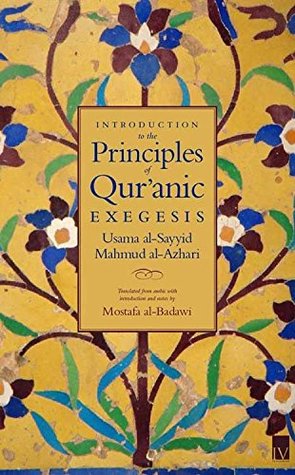Book Review: Usama al-Sayyid Mahmud al-Azhari: Introduction to the Principles of Qurʾānic ExegesisThis brief but important work is the synopsis of a proposed renewal of the Qurʾānic sciences of tafsīr inspired by the former Grand Mufti of Egypt ʿAlī Jumuʿah and distilled from his teachings by his able student, the author. Originally published in Arabic as Madkhal ilā ʿulūm al-tafsīr, it is the author’s introduction to Jumuʿah’s 300-page Qurʾānic commentary—itself based on lectures delivered at al-Azhar--al-Nibrās fī tafsīr al-Qurʾān al-karīm (Cairo: alWābil al-Ṣayyib, 2009), which covers the Fatiha and al-Baqara until verse 26. The Introduction is intended to help students of tafsīr as well as engage and inspire its experts. Its two main ideas are that more exegesis is needed for what the author calls the axes (maḥāwir) and objectives (maqāṣid) of the Qurʾān and, second, that such exegesis must show the relevance and applicability of the Qurʾān to contemporary issues. “To transform the verses of the Qurʾān into working programs is a most important matter…. It is a scientific endeavour that requires much study and research into the very manner of interpreting the Qurʾān [which] forms the background of all the sources of knowledge of the community, its sciences, methods of functioning and cognitive schemes. It defines its identity, shapes its behaviour and influences its history” (p. 24). The author draws abundantly from al-Ṭāhir b. ʿĀshūr’s ten prolegomena to Qurʾānic exegesis among many other sources and influences both past and contemporary. It is regrettable that oftentimes precise sourcing is not given and that the book is missing indices and a bibliography.
|
Gibril Haddad
|
|
© Center for Islamic Sciences. All Rights Reserved.
Designed and Developed by Crescent Marketing Solutions |


